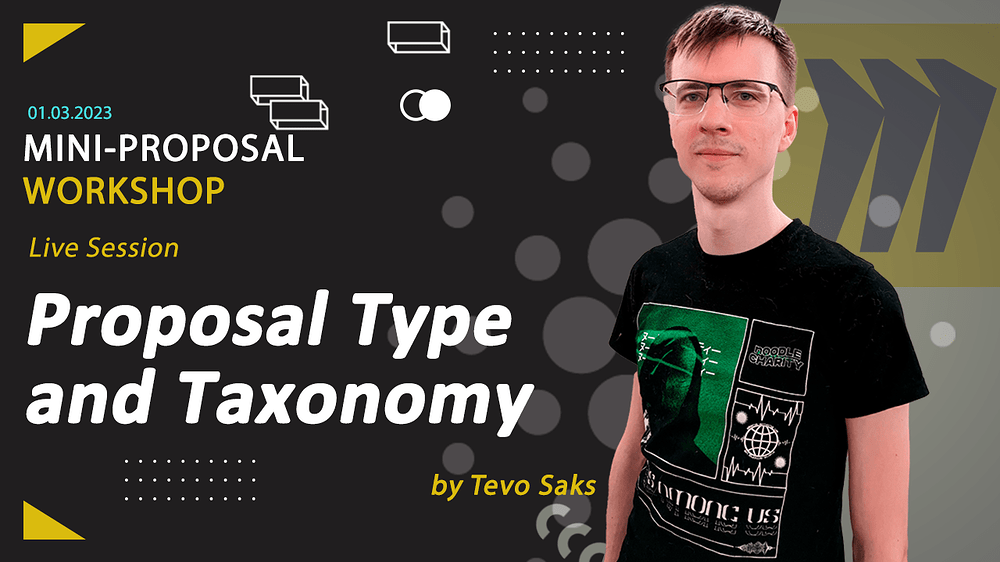The Cardano community is invited to participate in the Mini Proposal Workshop!
The Mini Proposal Workshop is an initiative aimed at addressing a problem where many proposals don’t effectively describe their ideas to voters. Our solution is to implement workshops to ideate on these proposal ideas.
![]() To get an overview of what the Mini Proposal Workshop is about, watch this video presented by TevoSaks:
To get an overview of what the Mini Proposal Workshop is about, watch this video presented by TevoSaks:
The shared templates include questions to help dive into the proposal idea and extract important information. The templates are separated into 10 different chapters:
![]() Chapter 1: Problem Ideation - We will look into the problem and why it is a problem, and then turn it into a problem statement.
Chapter 1: Problem Ideation - We will look into the problem and why it is a problem, and then turn it into a problem statement.
![]() Chapter 2: Solution Ideation - We will take the problem statement and start ideating on solutions, scoping down on the minimum viable product or service. We will also assess the realism of the solution and how it addresses the problem.
Chapter 2: Solution Ideation - We will take the problem statement and start ideating on solutions, scoping down on the minimum viable product or service. We will also assess the realism of the solution and how it addresses the problem.
![]() Chapter 3: Proposal Title Ideation - We will give a title to the proposal and consider how to prime the proposal.
Chapter 3: Proposal Title Ideation - We will give a title to the proposal and consider how to prime the proposal.
![]() Chapter 4: Proposal Type and Taxonomy - We will identify the type of proposal being made and how it fits into the taxonomy.
Chapter 4: Proposal Type and Taxonomy - We will identify the type of proposal being made and how it fits into the taxonomy.
![]() Chapter 5: Stakeholder Network - We will identify stakeholders and consider how the proposal benefits them.
Chapter 5: Stakeholder Network - We will identify stakeholders and consider how the proposal benefits them.
![]() Chapter 6: Defining Succes - We will define the success of the proposal by ideating on proposal outputs and outcomes, and also consider any risks the proposal may have and how to mitigate them. If participants are interested, we will also explore if the proposal fits under sustainable development goals and which of the 10 Project Catalyst challenges it may fit under.
Chapter 6: Defining Succes - We will define the success of the proposal by ideating on proposal outputs and outcomes, and also consider any risks the proposal may have and how to mitigate them. If participants are interested, we will also explore if the proposal fits under sustainable development goals and which of the 10 Project Catalyst challenges it may fit under.
![]() Chapter 7: Key Performance Measurements - We will identify key performance measurements for the proposal, including the current situation, expected situation, how the measurement will be made, and when it will be initiated if the proposal is funded.
Chapter 7: Key Performance Measurements - We will identify key performance measurements for the proposal, including the current situation, expected situation, how the measurement will be made, and when it will be initiated if the proposal is funded.
![]() Chapter 8: 5E Experience - We will outline the experience of using the proposed solution, including what captures the attention of the user, how they enter the experience, what they do with the idea, and the clear end of the experience. We will also consider what users can get out of the experience, whether it be something physical or digital.
Chapter 8: 5E Experience - We will outline the experience of using the proposed solution, including what captures the attention of the user, how they enter the experience, what they do with the idea, and the clear end of the experience. We will also consider what users can get out of the experience, whether it be something physical or digital.
![]() Chapter 9: Roles - We will identify the roles needed for the proposal and describe the responsibilities of each role, including any team members who can fulfil the role and how they will be compensated.
Chapter 9: Roles - We will identify the roles needed for the proposal and describe the responsibilities of each role, including any team members who can fulfil the role and how they will be compensated.
![]() Chapter 10: Proposal Cost and Delivery schedule - Budget and timeline: We will create a budget and timeline for the proposal, including any resources needed and a breakdown of costs.
Chapter 10: Proposal Cost and Delivery schedule - Budget and timeline: We will create a budget and timeline for the proposal, including any resources needed and a breakdown of costs.
Links & Resources:
Miro Board Template
Google Form To Register next live workshop
Google Form To Register your proposal
Catalyst School Website
Catalyst School Discord Server










